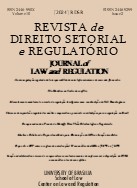Environmental license regulation and the theory of smart regulation of Neil Gunningham
uma contribuição de Neil Gunningham
Keywords:
Environmental licensing. Responsive regulation theory. Environmental impact. Smart regulation principles. Neil Gunningham.Abstract
[Purpose] Environmental licensing is a procedure through which the environmental regulator allows economic activities when they are potentially hazardous to the environment. The environmental license is a fundamental instrument to evaluate and enforce minimal standards to reduce ecological damage in Brazil. This essay analyzes how Neil Gunningham's proposal of responsive regulation could advance the existing framework for environmental licensing, dissociating this improvement from changes in legislation. Therefore, it points to regulatory policies that are more responsive driven than the current environmentalist regulation.
[Methodology] Our approach is the comparison between the principles for smart regulation as described by Neil Gunningham and the Brazilian legal design for environmental licensing.
[Findings] Our main findings report the possibility of expansion of the discretion entitled to the environmental agencies around environmental licenses to use them as instruments of regulation. In this regard, agencies should establish clear standards for granting and revising licenses. Additionally, the empowerment of social groups and NGOs in the regulatory process may contribute to this result. Moreover, we argue that a command and control regime approximates to a mixed instruments regulation, whenever it incorporates those principles.
[Practical implications] The essay proposes solutions that shift our current social licensing regulation to a more responsive model, without changing laws. Hence, our proposal relies only on Executive initiative, and that condition favors the implementation at any time.
Downloads
References
ANDREOLI, T. P. et al. Influência dos Selos Verdes no Comportamento do Consumidor. Consumer Behavior Review, 5, n. 1, Janeiro 2021. 128-139.
ARANHA, M. I. Manual de Direito Regulatório. 5. ed. Londres: Laccademia, 2019.
AYRES, I.; BRAITHWAITE, J. Responsive Regulation: Transcending the Deregulation Debate. Oxford: Orford University Press, 1992.
BIM, E. F. Licenciamento ambiental. Rio de JAneiro: Lumen Juris, 2014.
BRAITHWAITE, J. Responsive Regulation and Developing Economies. World Development, 34, n. 5, 2006. 884-898.
BRAITHWAITE, J.; GRABOSKY, P. Of Manners Gentle: Enforcement Strategies of Australian Business Regulatory Agencies. MElbourne: Oxford Universit Press/Australian Institute of Criminology, 1986. 27-54 p.
BRAITHWAITE, J.; HEALY, J.; DWAN, K. The Governance of Health Safety and Quality. [S.l.]. 2005.
BRASIL. Resolução CONAMA n.º 1, de 23 de janeiro de 1986. Brasília. 1986.
BRASIL. Resolução CONAMA n.º 9, de 03 de dezembro de 1987. Brasília. 1987.
BRASIL. Constituição da República Federativa do Brasil. Brasília. 1988.
BRASIL. Resolução CONAMA n.º 237, de 19 de dezembro de 1997. Brasília. 1997.
BRASIL. Lei n.º 9.605, de 12 de fevereiro de 1998. Brasília. 1998.
BURGEL, C. F.; DANIELLI, G. D. S.; SOUZA, D. R. Discricionariedade administrativa e licença ambiental. Revista Direito Ambiental e Sociedade, 7, n. 2, 2017. 265-304.
DECRETO N.º 6.514, Brasília. 2008.
FARIAS, T. Licenciamento ambiental: aspectos teóriso e práticos. 4. ed. Belo Horizonte: Fórum, 2013.
FILHO, M. A. M. Da regulação responsiva à regulação inteligente: uma análise crítica do desenho regulatório do setor de transporte ferroviário de cargas no Brasil. Revista de Direito Setorial e Regulatório, Brasília, 6, n. 1, Maio 2020. 144-163.
FINK, D. R. Aspectos jurídicos do licenciamento ambiental. Rio de Janeiro: Forense Universitária, 2004.
GUNNINGHAM, N. Environmental Law, Regulation and Governance: Shifting Architechtures. Journal of Environmental Law, 21, 2009. 179-212.
GUNNINGHAM, N. The New Collaborative Environmental Governance: The Localization of Regulation. Journal of Law and Society, 36, n. 1, 2009. 145-166.
GUNNINGHAM, N. Enforcing Environmental Regulation. Journal of Environmental Law, 23, n. 2, Julho 2011. 169-201.
GUNNINGHAM, N.; GRABOSKY, P. Smart Regulation: Designing Environmental Policy. Oxford: Claredon Press, 1998.
GUNNINGHAM, N.; SINCLAIR, D. Designing Smart Regulation. Paris: Organisation of Economic Co-operation and Development, 1998.
GUNNINGHAM, N.; SINCLAIR, D. Regulatory Pluralism: Designing Policy Mixes for Environmental Protection. Law & Policy, Oxford, 21, n. 1, Janeiro 1999. 49-76.
GUNNINHAM, N. Designing Smart Regulation. Paris: Organisation for Economic Co-operation and Development, 1998.
LOPES, O. D. A. Fundamentos da Regulação. Rio de Janeiro: Processo, 2018.
MACHADO, P. A. L. Direito Ambiental Brasileiro. São Paulo: Malheiros, 2009.
MILARÉ, É. Direito do ambiente: doutrina, jurisprudência, glossário. 5. ed. São Paulo: Revista dos Tribunais, 2007.
MOURA, E. A. D. C.; BRAGANÇA, V. B. R. D. A revisibilidade da concessão de licença ambiental à luz da controvérsia da discricionariedade administrativa dos atos ambientais. Revista Catalana de Dret Ambiental, X, 2019. 1-20.
OMENA, A. C. C. S. D. Controle jurisdicional da discricionariedade administrativa no licenciamento ambiental: uma análise da discricionariedade técnica no ordenamento jurídico brasileiro. Coimbra: Faculdade de Direito da Universidade de Coimbra, 2017.
Downloads
Published
How to Cite
Issue
Section
License
Copyright (c) 2024 Journal of Law and Regulation

This work is licensed under a Creative Commons Attribution 4.0 International License.
By submitting this paper to the Journal of Law and Regulation, I hereby declare that I agree to the terms of the Creative Commons Attribution 4.0 International (CC BY 4.0), available at http://creativecommons.org/licenses/by/4.0.


